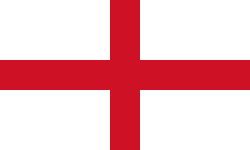| England at the Commonwealth Games | |
|---|---|
 | |
| CGF code | ENG |
| CGA | Commonwealth Games England |
| Website | teamengland |
| Medals Ranked 2nd |
|
| Commonwealth Games appearances (overview) | |
England is one of only six teams to have competed in every Commonwealth Games since the first Empire Games in 1930. The others are Australia, Canada, New Zealand, Scotland and Wales.
Contents
- Games summary
- Commonwealth Games
- Commonwealth Paraplegic Games
- Host nation
- Commonwealth Games England
- How it helps English competitors
- Funds
- Team symbols
- Brand identity
- Flag and victory anthem
- References
- External links
The Commonwealth Games is the only major multi-sport event in which English athletes and teams compete as England, organised by Commonwealth Games England ; at Olympic, Paralympic and European Games England participates as part of Great Britain and Northern Ireland, (along with Scotland, Wales and Northern Ireland, 10 of the 13 British Overseas Territories [1] and the three Crown Dependencies) through the British Olympic Association.
